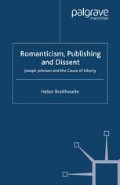Abstract
In the closing weeks of 1760 at the time of the death of George II a young newly-trained bookseller started up in business at a shop, the ‘Golden Anchor’, on Fenchurch Street in the heart of the City of London. The same age as the old king’s successor, he immediately brought out a sixpenny sermon which lamented the end of ‘so eminently glorious’ a reign but welcomed the peaceful accession of George III, delivered on 2 November to a local Presbyterian congregation by its minister, John Palmer. After a brief but unproductive stint a few hundred yards west on Lombard Street during the spring, by August he had settled into premises just north of London Bridge on Fish Street Hill. Among the first works he published from this new address was another sermon, preached on the day of George III’s coronation (22 September 1761) by a Baptist minister, John Johnson, in Liverpool. Like Palmer’s, this stressed that kings were wholly subordinate to the command of God and hoped that those ‘blessings’ which Britain had enjoyed for ‘above seventy years past’, especially the ‘full liberty’ of assembling together for worship, would continue.1 The cause of religious freedom was being trumpeted in the bookseller’s output even at the start, albeit humbly and respectfully by those who still in such matters had to crave a prince’s indulgence. It was the interests of this diverse group, above all, to which he was already most firmly and personally attached and which would go on to shape the entire future course of his activities.
[A]s long as there is a Protestant Dissenter in England, there will be a firm and intrepid friend to the Protestant Succession, to the liberty, and to the present happy constitution of this country.
Joseph Priestley, A View of the Principles and Conduct of the Protestant Dissenters (1769)
Access this chapter
Tax calculation will be finalised at checkout
Purchases are for personal use only
Preview
Unable to display preview. Download preview PDF.
Notes
See E. P. Thompson, The Making of the English Working Class (Harmondsworth: Penguin, 1991), p. 30n1;
and Donald Read, The English Provinces, c.1760–1960: a Study in Influence (London: Edward Arnold, 1964), pp. 4–5.
J. C. D. Clark, English Society 1688–1832: Ideology, Social Structure and Political Practice during the Ancien Regime (Cambridge: Cambridge University Press, 1985), p. 277.
Michael Watts, The Dissenters: From the Reformation to the French Revolution (Oxford: Clarendon Press, 1978), p. 48. Successive attempts to repeal the Test and Corporation Acts were made by dissenters in the 1730s but, despite (or, perhaps, even because of) their loyalty to the Whigs in government, had been defeated.
Robert Halley Lancashire: Its Puritanism and Nonconformity (2 vols; London: Hodder & Stoughton, 1869), II. 312n, 375.
Simon Maccoby English Radicalism 1762–1785 (London: George Allen & Unwin, 1955), p. 7.
See Herbert McLachlan, The Warrington Academy (Manchester: Chetham Society, 1943), p. 6;
and David L. Wykes, ‘The Dissenting Academy and Rational Dissent’, in Enlightenment and Religion: Rational Dissent in Eighteenth-Century Britain, ed. Knud Haakonssen (Cambridge: Cambridge University Press, 1996), pp. 130–9, which pursues these points more thoroughly.
A Scientific Autobiography of Joseph Priestley (1733–1804), ed. Robert E. Schofield (Cambridge, Mass. and London: MIT Press, 1966), p. 17; and MS 12.57 (61) Dr Williams’s Library (hereafter DWL).
Rutt, I. 158; and T. E. Thorpe, Joseph Priestley (London: J. M. Dent, 1906), p. 68.
See Robert E. Schofield, The Enlightenment of Joseph Priestley (Pennsylvania State University Press, 1997), p. 195; and Tyson, p. 39. Priestley’s final losses came close to £50 and he and Johnson attempted to recoup these by issuing a collected three-volume edition (remotely priced at 18s) in 1773.
The Butterworths and Bayleys were among the leading families in Manchester and worshipped at the city’s large dissenting meeting house. An ‘active and patriotic country gentleman’, Bayley (1744–1803) was also an enlightened magistrate and prison reformer and (like Percival) a later mover in the Manchester Literary and Philosophical Society. See Halley Lancashire, II. 311–12; and William Turner, The Warrington Academy (Warrington: Library and Museum Committee, 1957), p. 79.
A. E. Peaston, ‘The Revision of the Prayer Book by Dr. Samuel Clarke’, Transactions of the Unitarian Historical Society, 12 (1959–62), 27–38; and MS 12.44 (13–14) DWL.
John Gascoigne, ‘Anglican Latitudinarianism and Political Radicalism in the Late Eighteenth Century’, History, 71 (1986), 28; and Belsham, p. 111n.
For Essex Street’s connections with the power elite, see John Seed, ‘Gentlemen Dissenters: the Social and Political Meanings of Rational Dissent in the 1770s and 1780s’, Historical Journal, 28 (1985), 299–325.
Copyright information
© 2003 Helen Braithwaite
About this chapter
Cite this chapter
Braithwaite, H. (2003). Dissenting Origins. In: Romanticism, Publishing and Dissent. Palgrave Macmillan, London. https://doi.org/10.1057/9780230508507_1
Download citation
DOI: https://doi.org/10.1057/9780230508507_1
Publisher Name: Palgrave Macmillan, London
Print ISBN: 978-1-349-43046-8
Online ISBN: 978-0-230-50850-7
eBook Packages: Palgrave Literature & Performing Arts CollectionLiterature, Cultural and Media Studies (R0)

